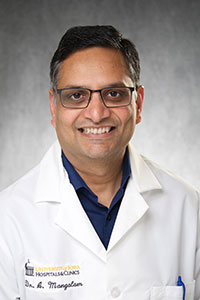Plant-based diet alters microbiome, reduces inflammation, and may protect against multiple sclerosis
A healthy diet reduces inflammation by enriching beneficial gut microbiota

A plant-based diet rich in isoflavones alters the composition of the gut microbiome in a way that reduces inflammation and appears to provide some protection against multiple sclerosis-like disease in mice. The new findings from the University of Iowa lab of Ashutosh Mangalam, PhD, UI associate professor of pathology, were published recently in Gut Microbes.
“This study strengthens the idea that a combination of isoflavone-rich diet with specific gut microbiota might provide health benefits and potentially be useful as a therapy for inflammatory diseases such as multiple sclerosis,” Mangalam says.
Isoflavones, which are found in soybeans and chickpeas and other legumes, are plant-derived chemicals that resemble estrogen and seem to have beneficial health effects. Previous research from Mangalam’s lab found that the combination of an isoflavone-rich diet along with gut bacteria capable of metabolizing isoflavones is protective in a mouse model of multiple sclerosis (MS). In addition, the team have also shown that people with MS lack gut bacteria that can metabolize isoflavone.
These earlier findings suggest that reestablishing a healthy microbiome in people with MS and combining that with a plant-rich diet may have the potential to improve disease symptoms in MS. However, to determine the feasibility of testing a dietary-based therapy in clinical trials for MS, the team needed to study whether switching to a diet rich in isoflavone has a beneficial effect on the composition of the gut microbiome and on MS-like inflammation.
Better diet, better gut health
Mangalam’s team, including first author Sudeep Ghimire, a UI postdoctoral scholar in immunology, compared the effects of switching mice from an isoflavone diet to an isoflavone-free diet and vice versa. Overall, they found that mice switched to an isoflavone-rich diet have better gut health, in terms of a more diverse and stable microbiome, compared to mice switched to a diet lacking isoflavones. They also showed that mice switched from an isoflavone-free diet to an isoflavone-rich diet showed reduced MS-like disease.
Importantly, the researchers showed that the isoflavone diet produces its beneficial effect by enriching gut bacteria with reduced ability to induce inflammation.
Besides promoting growth of bacteria that can metabolize isoflavone, the isoflavone-rich diet also promoted bacteria with lower levels of the bacterial toxins lipopolysaccharides (LPS), which are known to induce inflammation and promote disease. The team showed that LPS extracted from feces of mice on an isoflavone-rich diet induced lower levels of inflammatory molecules from immune cells in petri dish experiments. Conversely, a diet lacking isoflavones promoted a microbiome in mice that produced higher LPS levels as well as LPS molecules with increased capacity to induce inflammation.
“Our new study reveals additional mechanisms of disease protection by plant-based diet,” Mangalam says. “Specifically, it shows that a diet rich in isoflavones reduces inflammation through enrichment of healthy gut bacteria and modulation of LPS. These findings strengthen the idea that the combination of dietary isoflavones and these isoflavone-metabolizing gut bacteria may serve as a potential treatment for MS.”
The research was supported in part by the National Institute of Allergy and Infectious Diseases, the Veteran Affair Merit Award, the National Institute of Environmental Health Sciences, and the Roy J. Carver Charitable Trust.
In addition to Mangalam and Ghimire, the team included UI scientists Shailesh Shahi, Peter Lehman, Stephanie Peterson, and Nicole Cady (now a graduate student at University of Michigan), and Faraz Rashid and Shailendra Giri at Henry Ford Health System, Detroit, Mich.